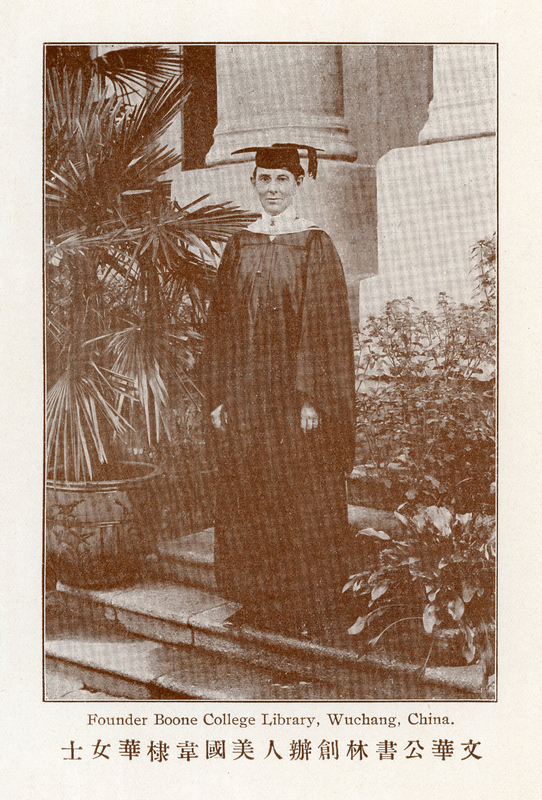Mary Elizabeth Wood
Mary Elizabeth Wood (1861-1931) was born in Batavia, New York, as one of eight children. She attended schools in Batavia and began her career as the first librarian at the local Richmond Public Library. In 1899, she visited her brother Robert, an Episcopal missionary in Wuchang, China and remained there to teach English at Boone University. During this time she solicited books from supporters in the United States for her students and colleagues, starting a small school library that would later become the Boone University Library.
While books and records had been collected and stored throughout Chinese history, they were often gathered in what current scholars would consider private libraries, the collections of which were held for the use of a privileged few. The modern Western-style public library was a twentieth-century import to China with Wood being a key figure in its establishment. In 1910, Boone University Library opened as “the first public library in China to be run on strictly modern lines.” In addition to its primary location, Boone University Library had public reading rooms throughout the city, which served over 90,000 readers per year by 1923, as well as an 1,800 volume traveling library that sent books hundreds of miles up and down the Yangtzhe River.
As modern public libraries spread across China, there was increasing demand for people to staff them. In 1920, Wood founded the library training school at Boone University that would later be known as the independent Boone Library School. Graduates of the three-year program knew both English and Chinese and could manage the variety of materials found in Chinese libraries, including texts on bronze and earthenware. As Wood wrote of them, “They have caught the Library spirit, and are taking part in the development of the Libraries where they are stationed.”
In 1923, as an effort to further fund the China library movement, Wood traveled to Washington, D.C. to lobby Congress for the remittance of $200,000 per year from the Boxer Indemnity Fund for the establishment and maintenance of fourteen libraries as well as a network of traveling libraries. She spoke personally with eighty-two senators and approximately four hundred Congressmen. Her proposal passed with overwhelming support.
Seven years later, in 1930, Wood created the Mary Elizabeth Wood Foundation for the further financial support of Chinese libraries. Mary Elizabeth Wood died on May 1, 1931, at the age of 69.

